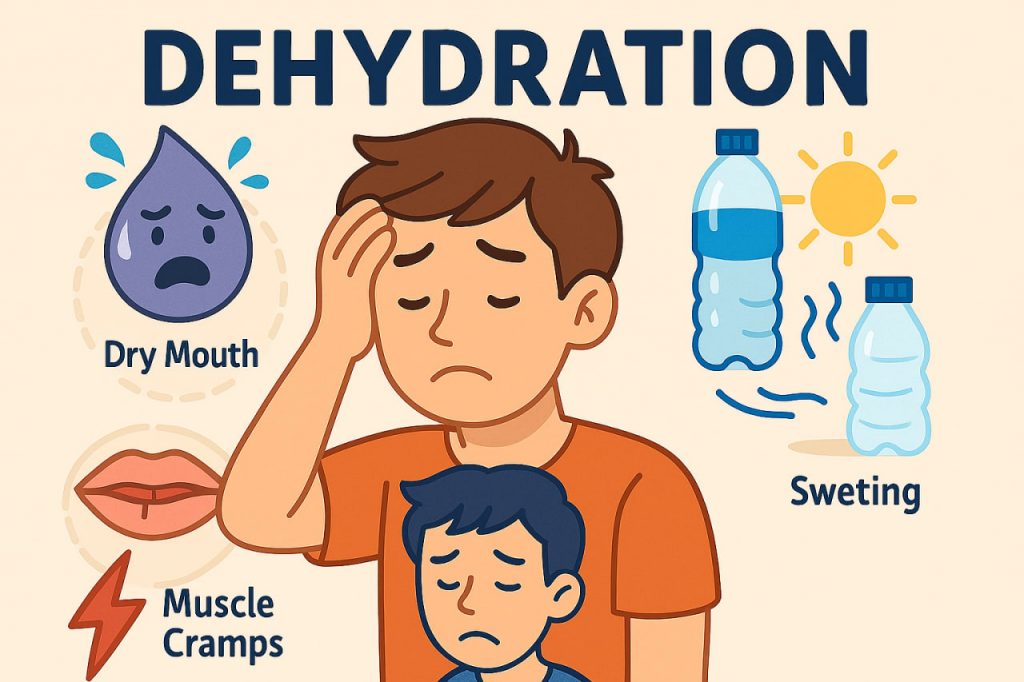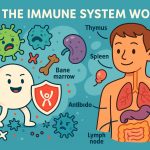Water is essential for nearly every function in the human body—from regulating temperature and supporting digestion to lubricating joints and carrying nutrients. When the body loses more water than it takes in, a condition called dehydration occurs. Even mild dehydration can cause noticeable symptoms, while severe cases may become life-threatening.
What Is Dehydration?
Dehydration happens when the body doesn’t have enough water to function properly. This can result from:
- Not drinking enough fluids
- Excessive sweating (e.g., during heat or exercise)
- Vomiting or diarrhea
- Fever or infection
- Diuretic medications
- Diabetes or kidney problems
How the Body Reacts to Dehydration
- Drop in Blood Volume
With less water in the bloodstream, the volume of blood decreases. This leads to lower blood pressure and reduced oxygen delivery to organs. - Increased Heart Rate
The heart compensates by beating faster to maintain circulation. - Dry Mouth and Skin
Less saliva production and dry skin are common signs of fluid loss. - Fatigue and Dizziness
As blood flow to the brain decreases, you may feel lightheaded, tired, or mentally foggy. - Muscle Cramps
Electrolyte imbalances can cause muscle spasms or painful cramps. - Dark Urine and Reduced Urination
The kidneys conserve water by concentrating urine, making it dark yellow or amber-colored. - Overheating
Without enough fluid, the body struggles to sweat and cool down, increasing the risk of heatstroke.
Signs of Dehydration by Severity
Mild to Moderate Dehydration
- Thirst
- Dry lips and mouth
- Headache
- Less frequent urination
- Dark-colored urine
- Irritability or difficulty concentrating
Severe Dehydration (Medical Emergency)
- Very dry skin and mouth
- Rapid heartbeat and breathing
- Confusion or delirium
- No urination for 8+ hours
- Sunken eyes
- Fainting or shock
Who Is Most at Risk?
- Infants and young children (higher fluid needs)
- Elderly people (reduced thirst sensation)
- Athletes (especially in hot weather)
- People with chronic illness (e.g., diabetes, kidney disease)
- Workers in high-heat environments
How to Prevent Dehydration
- Drink water regularly, not just when thirsty
- Increase fluid intake during hot weather, illness, or physical activity
- Eat water-rich foods like fruits (watermelon, oranges) and vegetables (cucumber, lettuce)
- Avoid excessive caffeine, which can have diuretic effects
- Use medical recommendations when sick with diarrhea or vomiting
How Much Water Do You Need?
- General guideline: about 2–3 liters (8–12 cups) per day
- Needs vary based on age, activity level, climate, and health status
- A good indicator is clear or light yellow urine
Conclusion
Dehydration is a simple problem with serious consequences if ignored. Staying hydrated is one of the easiest and most effective ways to support your health, energy, and brain function. Listen to your body, drink water regularly, and respond quickly to the signs of fluid loss.
Glossary
- Electrolytes: Minerals (like sodium, potassium, magnesium) that help balance fluids and support muscle and nerve function
- Urine Concentration: A sign of hydration level based on urine color
- Shock: A dangerous condition caused by low blood flow and oxygen
- Heatstroke: A medical emergency caused by body overheating due to fluid loss


